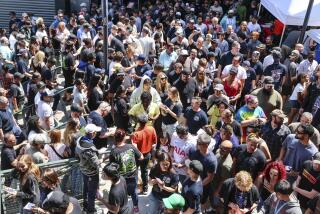Chicago teachers strike looms as negotiations enter final hours
- Share via
The clock’s ticking in Chicago, where teachers union representatives and school administrators have yet to agree on a new contract.
If they can’t find a compromise before midnight Sunday, 29,000 teachers and school workers might not show up for class.
A strike in the country’s third-largest public school district would be the nation’s first major teachers strike since 2006. The controversy threatens to strain relations between Chicago’s Democratic mayor, Rahm Emanuel, and the party’s union backers two months before a contentious presidential election.
Stuck in the middle are 404,000 students and their parents. The district has set aside $25 million to keep schools open between 8:30 a.m. and 12:30 p.m. in case of a strike.
Watching from the sidelines are public employees unions around the nation, which have seen successive losses in labor negotiations in recent years as a long decline in U.S. union participation has been accelerated by shrinking revenues and tighter budgets.
Sunday’s negotiations began at the Chicago Teachers Union headquarters. Union officials said 700 members were undergoing training in preparation for a strike, which hasn’t happened in Chicago for 25 years.
In a statement on Sunday, union spokeswoman Stephanie Gadlin said, “Both sides remain far apart on core issues such as job security, compensation and how to give our students a better day.”
Separating the two sides were cost-of-living raises, questions over longer school days and tying teacher compensation to test results rather than experience, a move supported by Emanuel, among other issues.
The district took away a 4% cost-of-living increase for teachers last year because of budget issues and has said it won’t make up for the loss.
Once a deal is reached, it would take at least an hour for the union to gather delegates to vote, union officials said.
Meanwhile, area tutors for the Black Star Project criticized the district and the union for failing to reach a deal and threatening to destabilize a troubled district in a troubled city. They also said the district’s contingency plans in case of a strike weren’t good enough.
“Parents are afraid the streets are going to embrace [their children] instead,” Dorothy Davis, Black Star director of operations, told the Chicago Tribune.
More to Read
Sign up for Essential California
The most important California stories and recommendations in your inbox every morning.
You may occasionally receive promotional content from the Los Angeles Times.











